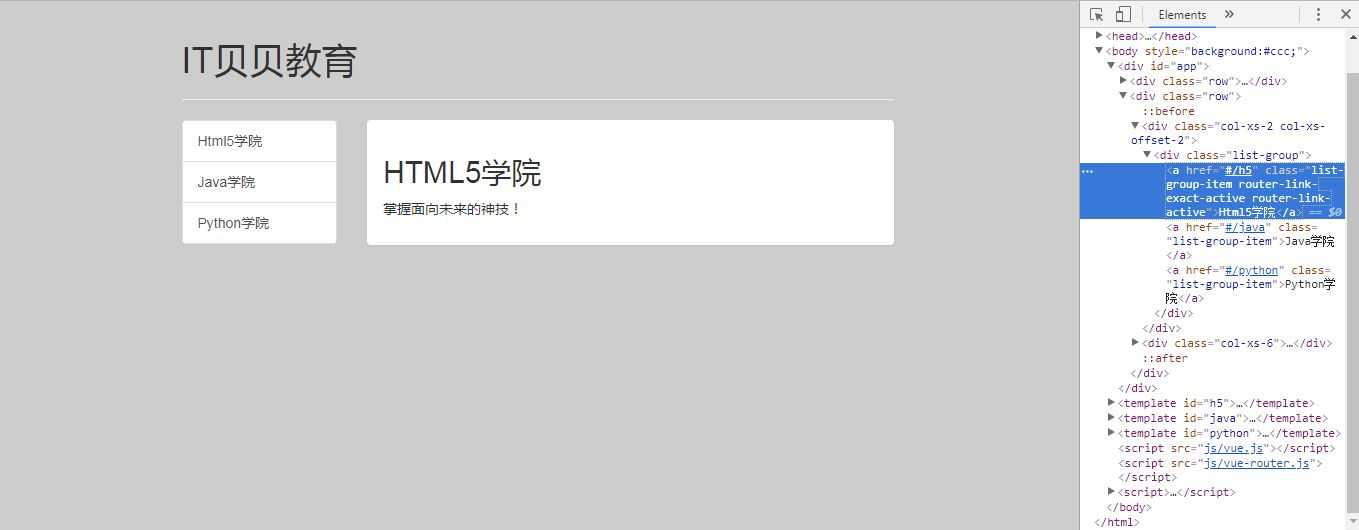Vue+Vue--Router结合开发
在实际开发中,用 Vue.js + vue-router 创建单页应用,是非常简单的。
在使用 Vue.js 时,我们就已经把组件组合成一个应用了,当你要把 vue-router 加进来,只需要配置组件和路由映射,然后告诉 vue-router 在哪里渲染它们。

一、Vue-Router
-
基本使用
<!DOCTYPE html> <html lang="en"> <head> <meta charset="UTF-8"> <title>Document</title> </head> <body> <div id="app"> </div> <template id="h5"> <div> <h2>HTML5学院</h2> <p>掌握面向未来的神技!</p> </div> </template> <template id="java"> <div> <h2>Java学院</h2> <p>都是Java是世界上最好的语言!</p> </div> </template> <template id="python"> <div> <h2>Python学院</h2> <p>现在好火热呀!</p> </div> </template> <script_top src="js/vue.js"></script_top> <script_top src="js/vue-router.js"></script_top> <script_top> // 1.创建组件 const Html5 = Vue.extend({ template = "#h5" }); const Java = Vue.extend({ template = "#java" }); const Python = Vue.extend({ template = "#python" }); // 2.定义路由 const routes = [ {path:‘/h5‘, component: Html5}, {path:‘/java‘, component: Java}, {path:‘/python‘, component: Python}, ]; // 3.创建路由实例 const router = new VueRouter({ routes }); // 4.创建Vue的实例,开挂载 new Vue({ router }).$mount(‘#app‘) </script_top> </body> </html>
1.一级路由:
<!DOCTYPE html>
<html lang="en">
<head>
<meta charset="UTF-8">
<title>Document</title>
</head>
<link rel="stylesheet" href="./bootstrap-3.3.7-dist/css/bootstrap.css">
<script_top src="./bootstrap-3.3.7-dist/js/jquery.min.js"></script_top>
<script_top src="./bootstrap-3.3.7-dist/js/bootstrap.js"></script_top>
<body style="background:#ccc;">
<div id="app">
<div class="row">
<div class="col-xs-8 col-xs-offset-2">
<div class="page-header">
<h1>IT贝贝教育</h1>
</div>
</div>
</div>
<div class="row">
<!--左边列表-->
<div class="col-xs-2 col-xs-offset-2">
<div class="list-group">
<!-- 使用 router-link 组件来导航. -->
<!-- 通过传入 `to` 属性指定链接. -->
<!-- <router-link> 默认会被渲染成一个 `<a>` 标签 -->
<router-link class="list-group-item" to="/h5">Html5学院</router-link>
<router-link class="list-group-item" to="/java">Java学院</router-link>
<router-link class="list-group-item" to="/python">Python学院</router-link>
</div>
</div>
<!--右边内容-->
<div class="col-xs-6">
<div class="panel">
<div class="panel-body">
<!-- 路由出口 -->
<!-- 路由匹配到的组件将渲染在这里 -->
<router-view></router-view>
</div>
</div>
</div>
</div>
</div>
<template id="h5">
<div>
<h2>HTML5学院</h2>
<p>掌握面向未来的神技!</p>
</div>
</template>
<template id="java">
<div>
<h2>Java学院</h2>
<p>都是Java是世界上最好的语言!</p>
</div>
</template>
<template id="python">
<div>
<h2>Python学院</h2>
<p>现在好火热呀!</p>
</div>
</template>
<script_top src="js/vue.js"></script_top>
<script_top src="js/vue-router.js"></script_top>
<script_top>
// 1.创建组件
const Html5 = Vue.extend({
template:"#h5"
});
const Java = Vue.extend({
template:"#java"
});
const Python = Vue.extend({
template:"#python"
});
// 2.定义路由
const routes = [
{path:‘/h5‘, component: Html5},
{path:‘/java‘, component: Java},
{path:‘/python‘, component: Python},
//配置跟路由
{path:‘/‘,redirect:‘/h5‘}
];
// 3.创建路由实例
const router = new VueRouter({
routes
});
// 4.创建Vue的实例,开挂载
new Vue({
router
}).$mount(‘#app‘)
</script_top>
</body>
</html>
运行结果:
